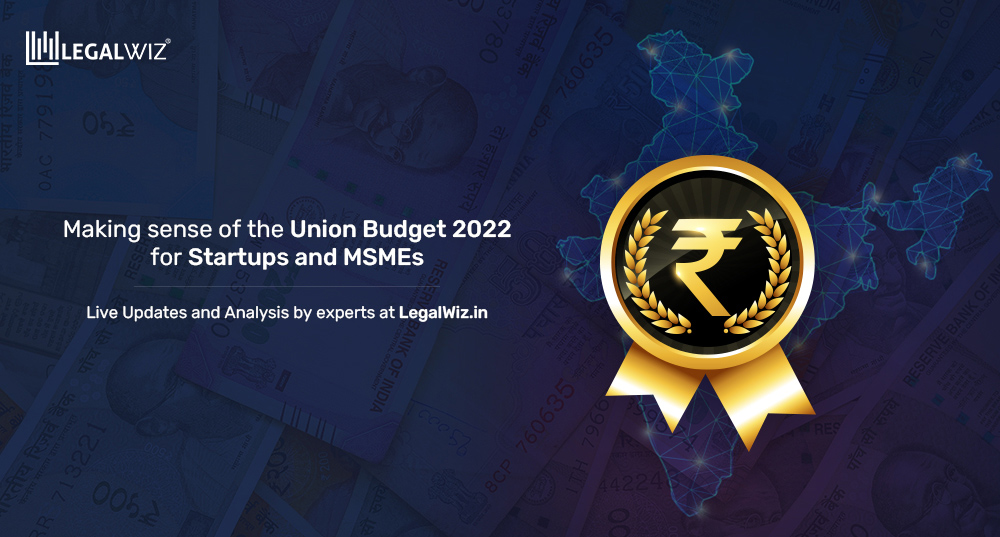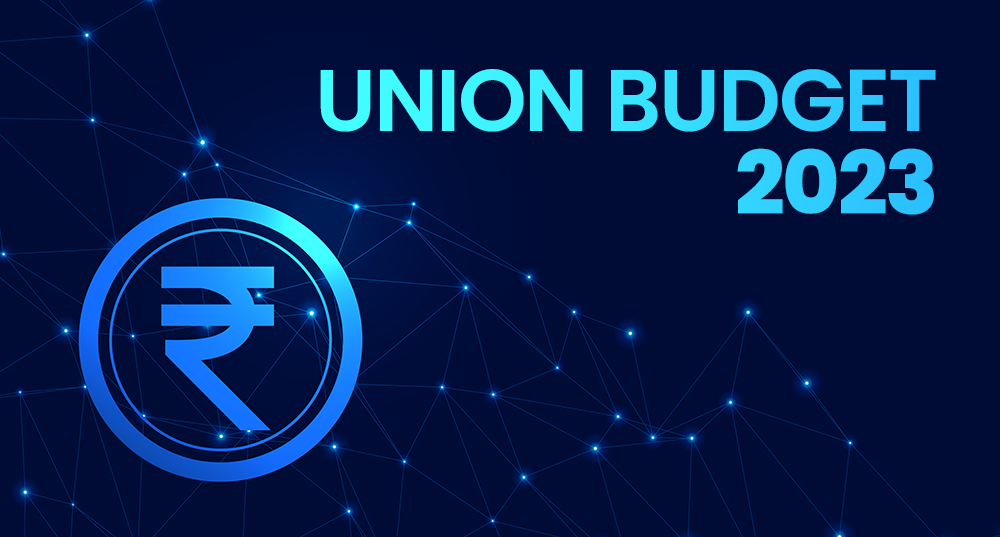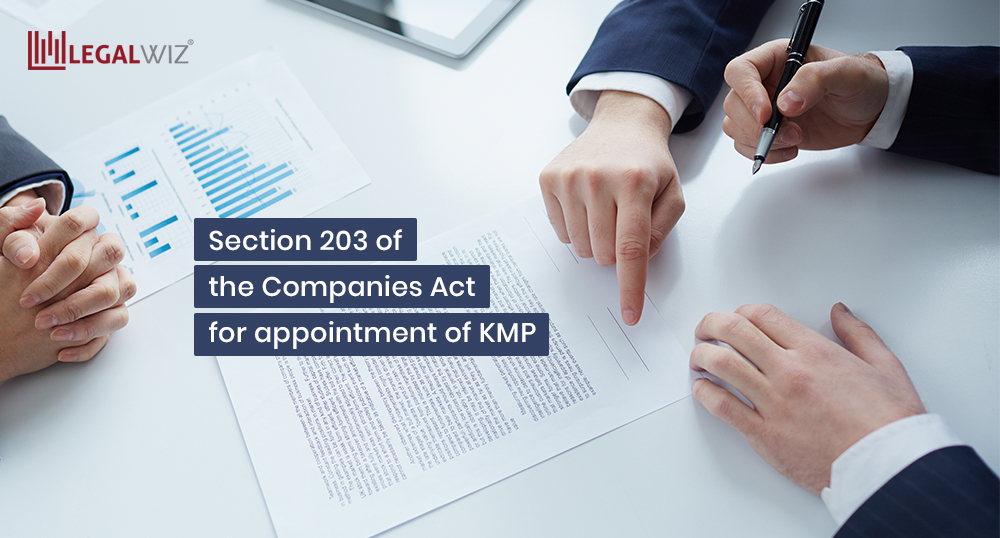Union Budget 2022 – Key Takeaways for Startups and MSMEs
The Union Budget 2022-23 was presented for the 4th time by Union Finance Minister, Smt. Nirmala Sitharaman on 1st Feb 2022. In yet another year affected by the ongoing COVID-19 pandemic, India’s growth is still estimated to be at 9.2%, the highest among all large economies. We bring you the simplified summary of the key takeaways from this budget, with a focus on Startups and MSMEs.
Focus Areas of Budget 2022-23
- PM Gati Shakti
- Inclusive Development
- Productivity Enhancement
- Sunrise Opportunities
- Energy Transition
- Climate Action
- Financing of Investments
Key Takeaways for Startups
Production Linked Incentives (PLI) Scheme: An outlay of Rs 1.97 Lakh Crores was announced for the Production Linked Incentive (PLI) Schemes across 14 key sectors, to create national manufacturing champions and generate employment opportunities for the country’s youth. Additional allocation of Rs 19,000 crore to boost manufacturing of solar modules under the government’s flagship Production Linked Incentive scheme was also announced. The FM believes that the scheme has the potential to create 60 lakh new jobs and additional production of 30 lakh crore jobs during the next five years. We are hopeful too!
Eligibility for Claiming Tax Holidays: In order to incentivise funding for the startups, extended capital gains exemption for investment in startups has been announced till 31/03/2022. Smt. Nirmala Sitharaman highlighted how startups have emerged as a driver of growth for our economy and how the country has experienced a welcome and massive surge in successful start-ups in recent years. Startups in India welcomed this move and the extension of start-up tax holiday is a demonstration of the government’s commitment to fostering a vibrant and active business ecosystem in the country.
The Drone Shakti Scheme for Startups: The government aims to facilitate and promote Drones as a Service (DrAAS) through Startups. Drone makers and service providers have already been ramping up their product offerings and hiring to meet a spurt in demand that is envisioned to accelerate with the government’s production linked incentive scheme planned to further down drone prices. The Covid-19 pandemic has proven to be a stimulus for India’s large-scale adoption of drones by government agencies. The drone technology has been welcomed with liberalised standards, transcending the use of drones formerly limited to government agencies alone. As the government is propelling and opening the drone industry in India, more companies and startups will gear up their investments in this sector. With India’s focus on Aatamnirbhar Bharat and the launch of new drone corridors and incentivising local manufacturers, the drone industry will transform the scenario across different sectors in the country.
Extended Eligibility for Tax Benefit: Startups have emerged as drivers of growth for India’s economy with an aim to boost this segment. The FM extended tax benefit for startups in this year’s budget. So far, the startups that were incorporated between April 1, 2016, till March 31, 2021, were eligible for this tax benefit scheme. The FM extended the eligibility to March 31, 2023, which is an additional year for the startups. Such startups will be eligible to get a 100% tax rebate on the profit made for a period of three years in a total time frame of ten years of operations provided that the overall annual turnover does not exceed Rs 25 crore in any financial year. This move is likely to help young startups in meeting their working capital requirements especially during the crucial initial years of their operations.
Funds for Agriculture and Rural Start-Ups: The National Bank for Agriculture and Rural Development (NABARD) would provide a fund with blended capital to fund startups working in the agricultural field and rural enterprises relevant for the farm produce value chain. The FM said that the government would promote the use of the Kisan Drone programme to encourage the use of UAVs for land surveys, crop assessment and insecticide spraying. The state governments will also be encouraged to revise the syllabi of agricultural universities to meet the needs of natural, zero-budget and organic farming. Ken-Betwa link project would be taken up, which would help irrigate up to 9.08 hectares of farmland.
25% R&D Budget Earmarked for Private Industry, Start-ups and Academia: Defence Research and Development will be opened up for the private industry, start-ups and academia with 25 per cent of defence R&D budget earmarked for them. Start-ups and Private industry will be encouraged to take up design and development of military platforms and equipment in collaboration with DRDO and other organisations through strategic partnership model. An independent nodal umbrella body will be set up to meet the wide-ranging testing and certification requirements of defence equipment. 68 per cent of the capital procurement budget has been earmarked for the domestic industry in 2022-23. This is aimed at boosting domestic manufacturing of defence equipment and reducing imports. In the previous budget, 63 per cent was earmarked for domestic procurement while in 2019-20 it was 58 per cent.
Concession Corporate Tax: The rate of 15% will be available for 1 more year till March 2024 for newly incorporated manufacturing companies. However, no changes have been made in personal income tax rates.
Key Takeaways for MSMEs
Interlinking Various Portals: MSME Portals such as Udyam, e-Shram, NCS & Aseem scope will be widened and interlinked. They will now perform as portals with live organic databases providing G-C, B-C & B-B services such as credit facilitation, enhancing entrepreneurial opportunities. MSME Guarantee cover has also been expanded by Rs. 50,000 Crore.
Extension of ECLGS (Focus on Hospitality and Related Enterprise): Under ECLGS, which is for helping companies tide over liquidity crunch resulting from Covid-19 curbs, banks provide additional loans to existing borrowers without asking for extra collateral. To encourage banks, these loans are fully guaranteed by the government against credit losses. This scheme will be key to ensure that MSMEs impacted by intermittent lockdowns in states get funding to stay afloat. Credit Guarantee Trust for Micro and Small Enterprises to facilitate additional credit of Rs. 2 lakh crore and expanded employment opportunities under Budget 2022.
Revamping CGTMSE: Credit Guarantee Fund Trust for Micro and Small Enterprises (CGTMSE), which was jointly set up by the MSME Ministry and SIDBI in 2000 to catalyse the flow of institutional credit to micro and small enterprises (MSEs) will be revamped with necessary funds. CGTMSE Scheme will be revamped with the required infusion of funds. This will facilitate additional credit of Rs. 2 lakh crore for micro and small enterprises and expand employment opportunities.
RAMP (Raising and Accelerating MSME Performance) Programme Rollout: A Raising and Accelerating MSME Performance (RAMP) programme will be rolled out by the government with a Rs 6,000 cr outlay spread over a span of 5 years to help micro, small and medium enterprises (MSME) sector become more resilient, competitive and efficient. It is important to both create liquidity for MSMEs as well as ensure that it reaches those most in need.
Direct Tax:
- New provision to file an updated return on payment of additional tax within 2 years from the end of the assessment year.
- Reduced rates and surcharge for co-operatives to 15% and 7% (more than Rs. 1 crore income up to Rs. 10 crores) respectively.
- Reduced AMT rate of 15% for cooperative banks and society.
- Section 80DD to include lumpsum annuity payment.
- Tax relief for persons with a disability- Available to parent/ guardian of the differently-abled- Payment of Annuity or Lumpsum during the lifetime of parent or guardian, once parent or guardian has attained 60 years of age.
- NPS deduction- threshold limit increased from 10% to 14% for state government employees. It enables parity between employees of Central and State government employees.
- The benefit of reduced tax rate under Section 115BAB extended by another year up to 2024.
- 30% tax on transfer of bitcoins and similar digital assets! (Gains shall be taxed at 30%, no deduction allowed or set off with other income is disallowed. TDS at 1% above a threshold, any gift to be taxed in the hands of the receiver. Except for the cost of acquisition, no expenses to be included in the computation of digital assets.)
- Services from IFSC to be exempt from tax.
- The surcharge of AOP is capped at 15%.
- Surcharge and cess on income is not allowed as business expenditure.
- Surcharge on all Long Term Capital Gains (LTCG) capped at 15%.
- Brought forward losses cannot be set off against undisclosed income detected during the search and survey.
Indirect Tax:
- Customs duty on cut and polished diamonds and gemstones reduced to 5%.
- Customs duty on imitation jewellery – Rs. 400 per kg on its imports.
- MSME- Duty on umbrellas raised to 20%, exemption to parts of these are withdrawn; Tools for agri sector – exemption on steel scrap extended by another year.
- To incentivize exports- duty on specified leather, packaging boxes reduced.
- Unblended fuel will attract additional excise duty at Rs. 2 per litre.
Were your expectations met?
The focus clearly seems to be on the future and where India is headed. Exciting new avenues have been opened up by the government for start-ups and MSMEs to not only innovate their way to the top but also work alongside the government on crucial projects. Connect with the experts at LegalWiz.in to explore what else you can do as a founder, innovator and leader!

Labdhi Kochar
Labdhi Kochar is a legal whiz who makes startup laws sound almost fun (yes, really!). With expertise in business structuring, fundraising, and IP rights, she helps entrepreneurs turn their ideas into well-planned, legally sound ventures. Whether she’s building rock-solid business structures or simplifying compliance jargon, Labdhi believes legal knowledge should be practical and accessible. When she’s not decoding legal complexities, you’ll probably find her indulging in her true passion-shopping like it’s a full-time job!







